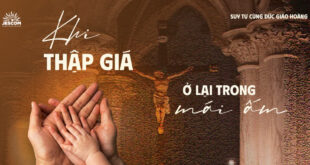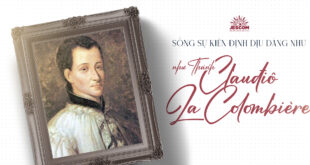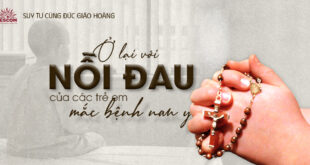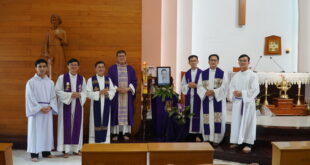Nicholas Austin, S.J.
 So what have you decided to give up for Lent? We often we hear that the important thing is not to give something up, but to do something positive. But it’s strange, isn’t it, that the feeling still sticks that Lent is really about giving up stuff? Giving up chocolate, giving up alcohol, giving up desserts, giving up cigarettes, giving up TV, giving up meat on Fridays…. For better or worse, we tend to ask ourselves not ‘What am I going to do, in a positive way, for Lent?’ but ‘What am I going to give up?’ So why are we so fixated on fasting, abstaining, giving stuff up?Giving up chocolate? Deleting your Facebook account? We all choose to mark Lent in different ways and more often than not focus on abstaining from something we enjoy, but is this always good for us? Nicholas Austin SJ explores how our attempts at an ascetic way of life for forty days each year can go wrong if our motivations are not rooted in the wisdom of the Christian tradition. How can we rediscover the virtue of asceticism?
So what have you decided to give up for Lent? We often we hear that the important thing is not to give something up, but to do something positive. But it’s strange, isn’t it, that the feeling still sticks that Lent is really about giving up stuff? Giving up chocolate, giving up alcohol, giving up desserts, giving up cigarettes, giving up TV, giving up meat on Fridays…. For better or worse, we tend to ask ourselves not ‘What am I going to do, in a positive way, for Lent?’ but ‘What am I going to give up?’ So why are we so fixated on fasting, abstaining, giving stuff up?Giving up chocolate? Deleting your Facebook account? We all choose to mark Lent in different ways and more often than not focus on abstaining from something we enjoy, but is this always good for us? Nicholas Austin SJ explores how our attempts at an ascetic way of life for forty days each year can go wrong if our motivations are not rooted in the wisdom of the Christian tradition. How can we rediscover the virtue of asceticism?
The way of asceticism
‘There are only two philosophies of life,’ Fulton J. Sheen once said, ‘one is first the feast and then the headache; the other is first the fast and then the feast.’ Today, more than ever, the time is ripe for a recovery and renewal of this second ‘philosophy,’ the way of asceticism.
At a surface level, asceticism (the constellation of the practices of voluntary self-denial such as fasting from food) does not hold much attraction for us today. In the film version of The Da Vinci Code, the crazy and murderous albino monk, Silas is depicted whipping himself and wearing a chain wrapped around his leg that he tightens so as to draw his own blood. What such a picture conveys is fanaticism, self-hatred and a religious practice divorced from all that is holy, healthy and good.
Yet there are numerous signs in our culture today that, at a deeper level, there is a desire for a freeing asceticism, if only we knew how to practise it. In the era of retail therapy and consumerism, we hear about people who have discovered the benefits of downsizing, de-cluttering and material simplicity. Caught in the incessant and hectic pace of modern life, we yearn for a way to step off the conveyor belt of busy-ness and find some space just to be, to be with others, to be with God. Drowning in an infinite sea of calories, we buy into a multi-billion pound yet apparently ineffective diet industry, with its promises to ‘naturally’ cleanse the toxins from our bodies, ‘juice fasting’ and a thousand varieties of quasi-ascetical practices. Aware of our propensity to unintentional overuse of the internet and our other communication gadgets, we yearn for the freedom that comes from being ‘unplugged,’ but can’t quite bring ourselves to pull the plug, even for a few hours. Is there, then, a way to recover from the Christian tradition the wisdom for an authentic practice of asceticism that can lead to the freedom and prayerfulness that, now more than ever, we yearn for?
Three distortions
The first thing to notice is that the Christian tradition is quite aware that fasting and abstinence can go wrong in a number of fairly predictable ways. I shall note three prominent distortions to which asceticism is especially susceptible, and the remedies that the tradition prescribes.
1. The distortion of excess
The first kind of danger to which asceticism is prone is that of excess. Fasting for long periods, for example, can lead to self-inflation and pride at one’s own achievements, and end up being counter-productive. As almost anyone who has every tried dieting knows, excessive fasting is quickly followed by the binge. At its extremes, it can even be damaging to one’s health, as it was for Saint Ignatius of Loyola shortly after his conversion. Later, as he grew in discernment and maturity, he realised that such heroic fasting was not what God desires.
The traditional corrective to excessive fasting is the doctrine of the ‘mean.’ The mean is the middle-way between too much and too little. A helpful analogy is a musical instrument: to keep it in tune, the strings should be neither too taut nor too relaxed, but in the mean. Saint Thomas Aquinas points out that even fasting is a matter of the mean: one should not fast to such an extent that one damages one’s health, or becomes too weak to perform the tasks of one’s occupation, for that would be to go to excess. Following the Stoic philosophers, he recommends the gradual approach: start small, approach the mean bit by bit. It is better to be patient, to be gentle, rather than attempt the spectacular, and risk the equally spectacular crash.
Today, we are so far towards the other extreme that excess in fasting is hardly our primary danger. Thomas makes a challenging statement that may surprise us today, but is worthy of our serious consideration: fasting, he says, is not merely a church law, but a requirement of human nature itself. In other words, an adult human being cannot hope to find the right balance in life, can’t hope to find the mean, unless by a regular practice of fasting. Otherwise, our desires for things that are good in themselves overrun their bounds and end up enslaving us.
Finding the mean in asceticism today, the mid-point between excess and laxity, is a task that will require attentiveness to the wisdom of the tradition as well as an exercise of the Christian imagination. The new asceticism today will not involve just fasting from food, but from any aspect of modern life in which compulsion starts to take over and we lose our freedom, our balance. If I buy stuff as a means of feeling better, perhaps I need to fast from shopping; if I find myself obsessively checking Facebook and Twitter, or checking my texts or emails, perhaps I need to fast from that; and so on. In any case, what we need is a creative fidelity to the traditional practices of fasting and abstinence, aware that the asceticism of ages past needs to be recovered but also adapted to a new age of consumerism, internet and environmental degradation.
2. The distortion of dualism
The second way that asceticism can be distorted is more subtle, and therefore more insidious. In Catholic spirituality, those seeking progress in the spiritual life were often encouraged to ‘mortify’ their flesh, literally put it to death. Of course, the ‘flesh’ here refers not to the body itself, but to our sinful nature. Nevertheless, the impression unintentionally conveyed, at least sometimes, was that the spiritual life means rejecting all that is of the body. In other words, there is the risk of a dualism that sees the soul as good, and the body and the material world as evil.
Such a dualism is of course strongly discordant with some of the basic tenets of the Christian faith, the doctrines of Creation, Incarnation and Resurrection. We believe that, at the creation, God was able to look at the world he had created and see that it was ‘very good’ (Genesis 1:31). We believe that in Jesus Christ, God became flesh and so sanctified the human body. We believe that, on the last day, the body as well as the soul will be taken up into Christ’s resurrection. There is no place within our faith, then, for a rejection of the body and the material world as impure.
The risk, then, is that our ascetical practices unconsciously become infected by a disdain for our bodies, our passions, our sexuality, which should be seen as a precious gift from God. The point of an authentically Christian asceticism is not to free the soul from the body, nor even to repress the body and its impulses, but to raise these to a truly spiritual level, to integrate them into the spiritual journey towards God.
3. The distortion of empty religiosity
In order to identify the third and final distortion of asceticism, we need to attend to the compelling words of the prophet Isaiah (58:5-6):
Is that what you call a fast, a day acceptable to the Lord?
Is not this the kind of fasting I have chosen: to loose the chains of injustice and untie the cords of the yoke, to set the oppressed free and break every yoke?
Here the prophet attacks an empty religiosity that attempts to curry favour with God without attending to the basic duty of justice towards the poor. Empty religiosity, by focusing exclusively on external religious practice, is an escape from the real world: the power of religious practice to open the heart to a transformation leading to a deeper love of God and neighbour is lost.
Yet we should not misread Isaiah’s critique as an attack on the practice of fasting as such. Isaiah was speaking in a time when ascetical practices were taken for granted, part of the fabric of everyday life. He called people to realise that their religious practices had no meaning unless there was a union between them and the way they treated others. Today, we are often tempted in a different way, to assume that true religion is simply about how we treat others, and that we no longer need a spirituality incarnated in concrete religious practices such as fasting. In this regard, we may recall the memorable criticism by the anthropologist, Mary Douglas of the view that exterior practice has nothing to do with true spirituality or authentic religion:
For it is a mistake to suppose that there can be religion which is all interior, with no rules, no liturgy, no external signs of inward states. As with society, so with religion, external form is the condition of its existence…
(Mary Douglas, Purity and Danger: An Analysis of Concepts of Pollution and Taboo [New York /Washington: Praeger, 1966], p.62.)
What the prophets call us to is not a rejection of ascetical practice, but an authentic fasting that involves us body and soul. Then fasting will become, not an escape from the real world, but a way of coming closer to those who practise, in the words of Gandhi, an ‘eternal, compulsory fast,’ simply because they do not have enough to eat.
Why fast?
As we have seen, if we are to engage in a healthy and holy asceticism today, we need to attend the wisdom that we find within our tradition, that can help us to avoid the pitfalls of excess, of dualism and of empty religiosity. Equally importantly, the tradition teaches us to avoid over-corrections that lead to a disembodied spirituality or a too relaxed approach. But what, ultimately, are the reasons for asceticism? What is the ultimate point?
Most obviously, fasting can help us to find a proper authority over ourselves. Today we have a thousand ways of making ourselves feel good: I know, I’ll eat something nice, or have a drink, or surf the internet, or check whether a friend has texted me, or turn on the TV, or listen to my iPod, or go clothes shopping, or buy something from Amazon, or play a computer game. All of these things can be good, but if we continually use them to make ourselves feel better, we can become slaves to the things we enjoy. When we don’t have them, we crave them. When we lack them, we feel depressed. When we realise we shouldn’t overdo it, we can’t help ourselves. So in Lent, when we give stuff up, we exercise authority over it, instead of letting it control us. We try to unchain ourselves. We try to become free.
But there’s a deeper reason to fast. ‘Filled with the Holy Spirit, Jesus returned from the Jordan and was led by the Spirit into the desert for forty days.’ (Luke 4:1) Recently my class of university students read the autobiography of Dorothy Day, the social activist and found of the Catholic Worker Movement. Some people consider her a modern-day saint. The book tells of how, as an adult, she became an atheist, but then was gradually led back to prayer and to God, so that she converted to Catholicism, and committed her life to working for the poor and for social justice. But she entitles the book, The Long Loneliness. And she describes how, at times, she experienced a terrible loneliness in her life. She longed to be with people, with those she loved, and felt the pain of separation and grief. But despite the pain of loneliness she experienced, it’s as though she realised her loneliness was not all negative. In that experience of being lonely, she longed to be with the poor and she longed to know God.
So I asked my students once they had read the book, ‘Can you relate to that experience of loneliness? Do you ever spend time alone?’ And the responses were striking. One student confessed that those parts of the book about loneliness terrified her. Another student said that she spends virtually no time alone, and when she is alone, she has some electronic device to turn to: her mobile phone, or the computer – checking Facebook or email. Another said he had begun to learn to deliberately make time without his computer or phone, so that he could have time to reflect or think. And another said the only time he really got to be alone was when he went for a run, but that such time was precious to him precisely because it was his only time to think.
The fact is that it is difficult to withdraw into the desert with Jesus today. We live in an age of distraction, where we have a thousand different ways of filling up that void of loneliness. And to some extent, that means we’re missing out. A recent report in the United States surveyed the use of electronic devices by children aged 8 to 18. It wanted to know how much children are plugged-in to an iPod or a television or the internet or a mobile phone and so on: how much time a child spent exposed to the media. A few years ago it was over 6 hours a day; today, the American child spends, on average, 7 hours and 28 minutes a day plugged in to some electronic device. That’s over 50 hours a week.
‘Filled with the Holy Spirit, Jesus returned from the Jordan and was led by the Spirit into the desert for forty days.’ And, during his public ministry, Jesus deliberately, repeatedly, persistently, withdrew at times from the crowds in order to be alone. Especially when things were most busy and demanding, he developed the asceticism of alone time. He spent time alone, in lonely places, in order to spend time with God.
And so I think this Lent is an invitation for us to be led by the Holy Spirit into the desert, to accompany our Lord as he withdraws into a lonely place. This Lent is a time for us to unplug a little bit, to cultivate that interiority, to use an old-fashioned but valuable word. Above all, this Lent is a time for us not to be afraid of choosing to be alone, but to trust that, even in our loneliness, indeed especially there, the Spirit of Jesus is with us, drawing us to the Father.
Nicholas Austin, S.J. teaches Ethics at Heythrop College, University of London
8 March 2011








